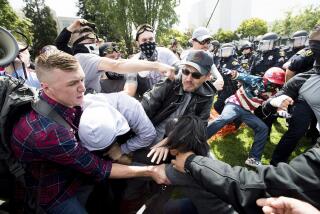Charges Against 8 in PLO Case Dismissed, but U.S. Will Refile
- Share via
An angry immigration judge Monday abruptly dismissed charges against eight immigrants accused of belonging to a Marxist faction of the Palestine Liberation Organization when prosecutors did not produce a key immigration official, as the judge had ordered.
“All eight proceedings are through,” Immigration Judge Ingrid K. Hrycenko announced to a stunned courtroom.
However, government attorneys immediately announced that the charges will be refiled and that the case will proceed against the defendants, seven Jordanians and a Kenyan.
“Nothing’s changed,” Esmeralda Cabrera, the government attorney in charge of the case, said after the judge’s decision. “The cases are very much alive.”
The courtroom, packed with the defendants’ relatives and supporters, erupted in cheering at Hrycenko’s ruling, which came only minutes into the start of a due-process hearing.
Then, as the defendants were hugging their relatives and friends, the court clerk ordered everyone to be seated so that Hrycenko could return to the bench to make another statement.
Once again, the judge declared that the case was “terminated.”
“I will no longer tolerate any of those tactics,” she said to the government lawyers, referring to their failure to have the immigration official in court.
Hrycenko’s dismissal of the charges came after attorneys for the U.S. Immigration and Naturalization Service did not produce the INS’ supervising criminal investigator, Gilbert Reeves, for questioning by the court and defense attorneys.
Reeves had been the acting INS director in Los Angeles last December when the government issued, in effect, arrest orders for the eight immigrants, forcing them to face deportation hearings.
Reeves was to have testified during the second day of a hearing into whether the immigrants’ due-process rights under the Fifth Amendment had been violated.
Defense attorneys had claimed that their clients were being selectively prosecuted by the government for their unpopular political views, and they wanted to question Reeves about why the government arrested the defendants.
‘Documents They Can’t Explain’
At a news conference Monday afternoon, the defense charged that the government did not produce Reeves because prosecutors did not have evidence to support the charges against the eight aliens.
“They have (deportation) documents they can’t explain,” Mark Rosenbaum, an attorney with the American Civil Liberties Union and a member of the defense team, told reporters.
The immigrants’ lead attorney, Dan Stormer, said that as soon as INS attorneys refile the charges, he will move to hold a hearing in Immigration Court charging “government misconduct.”
Stormer said he would base his charges on “the refusal of the government” to produce Reeves and “an attempt to manipulate the process so that they wouldn’t have to remain in front of Judge Hrycenko.”
A Justice Department source told The Times that the government welcomed the possibility of having a new judge assigned to the complex and controversial case.
Last week, Hrycenko, a former federal prosecutor, overrode government objections that she did not have authority to hold a due-process hearing, and she raised questions about the authority of INS official Reeves to sign the original deportation orders.
“Was that a slick move or was that a slick move,” one government official, who asked for anonymity, said, referring to the government’s decision to not produce Reeves and resulting in Hrycenko dismissing the charges and likely setting the scene for a new judge to hear the case.
But government officials said they did not specifically withhold Reeves from the courtroom to force the selection of a new judge. In fact, one top official, who asked not to be named, said he believed that Hrycenko herself “was looking for a way to dismiss the case.”
Hrycenko declined a reporter’s request to comment on her decision.
Original Orders
Reeves, as acting INS director last December, signed the original orders against the eight to show cause why they should not be deported for allegedly belonging to the Popular Front for the Liberation of Palestine, a PLO faction.
The immigrants’ arrests in January caused a furor in the Arab community and among civil rights groups, particularly when the eight aliens were placed in maximum-security cells at Terminal Island Federal Prison before being released in February.
All eight defendants, none of whom have been accused of any criminality, have denied any association with the Popular Front for the Liberation of Palestine.
Over the weekend, sources said, government attorneys met and determined that they wanted Ernest Gustafson, the INS’ Los Angeles district director, and not Reeves, to testify at Monday’s due process hearing.
The move, sources said, was spurred by Hrycenko’s comments last week about Reeve’s authority to sign the deportation orders and the fact that they believed that Gustafson could make a better presentation of the government’s reasons for the arrests.
As a result, before Monday’s session convened, Gustafson appeared in the tiny immigration courtroom and served new deportation orders on the eight defendants, which were signed by him, not Reeves.
Standing By
Having done this, Cabrera later said she assumed that Gustafson could take Reeves’ place on the witness stand, but that Reeves was standing by just in case.
Hrycenko clearly was angered by the maneuver.
The afternoon hearing was only a few minutes old when Hrycenko turned to Cabrera and asked if Reeves was present. Cabrera replied “no,” and apparently was in the process of telling Hrycenko that Reeves was standing by, if the judge demanded his presence, when Hrycenko announced her decision to dismiss all eight cases.
A government source said Hrycenko apparently had become so angered that the prosecution had not produced Reeves, that she forgot to ask INS attorneys whether they would appeal her decision. She did so on her second appearance and was informed the government will appeal.
But government attorneys said an appeal was secondary to the fact that they believed the case could, at the same time, be restarted based on the new deportation orders signed by INS official Gustafson on Monday.
FBI Investigation
After a three-year FBI investigation into the Popular Front for the Liberation of Palestine, the government last January charged Khader Musa Hamide, 33, of Glendale and Michel Ibrahim Shehadeh, 30, of Long Beach with being the California ringleader of the organization and the Los Angeles-area leader, respectively. Both faced deportation on subversion charges under the McCarran-Walter Act.
The six other defendants faced the same subversion charges until April 23, when the government charged them with various visa violations. Government attorneys said, however, that the six were as much a national security risk as the other two immigrants.
More to Read
Sign up for Essential California
The most important California stories and recommendations in your inbox every morning.
You may occasionally receive promotional content from the Los Angeles Times.










